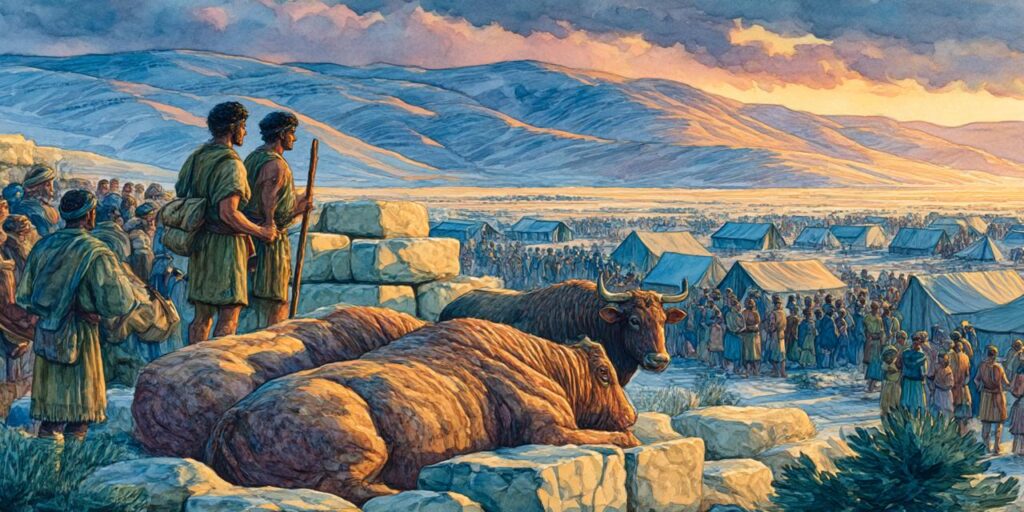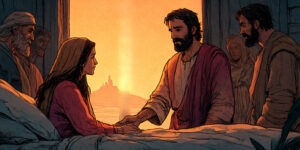
Peace
The gospel claims something bold: God offers real peace. Peace with Him, peace inside yourself, and peace with other people. But that peace isn’t automatic…

Then Nahash the Ammonite went up and besieged Jabesh-gilead, and all the men of Jabesh said to Nahash, “Make a treaty with us, and we will serve you.” But Nahash the Ammonite said to them, “On this condition I will make a treaty with you, that I gouge out all your right eyes, and thus bring disgrace on all Israel.” The elders of Jabesh said to him, “Give us seven days’ respite that we may send messengers through all the territory of Israel. Then, if there is no one to save us, we will give ourselves up to you.” When the messengers came to Gibeah of Saul, they reported the matter in the ears of the people, and all the people wept aloud.
Now, behold, Saul was coming from the field behind the oxen. And Saul said, “What is wrong with the people, that they are weeping?” So they told him the news of the men of Jabesh. And the Spirit of God rushed upon Saul when he heard these words, and his anger was greatly kindled. He took a yoke of oxen and cut them in pieces and sent them throughout all the territory of Israel by the hand of the messengers, saying, “Whoever does not come out after Saul and Samuel, so shall it be done to his oxen!” Then the dread of the Lord fell upon the people, and they came out as one man. When he mustered them at Bezek, the people of Israel were three hundred thousand, and the men of Judah thirty thousand. And they said to the messengers who had come, “Thus shall you say to the men of Jabesh-gilead: ‘Tomorrow, by the time the sun is hot, you shall have salvation.’” When the messengers came and told the men of Jabesh, they were glad. Therefore the men of Jabesh said, “Tomorrow we will give ourselves up to you, and you may do to us whatever seems good to you.” And the next day Saul put the people in three companies. And they came into the midst of the camp in the morning watch and struck down the Ammonites until the heat of the day. And those who survived were scattered, so that no two of them were left together.I Samuel 11:1-11
The story of Jabesh-Gilead opens like a political crisis—but it carries deep spiritual meaning. After Israel had settled in the Promised Land, their incomplete obedience left enemy nations still scattered among them. One of those enemies, the Ammonites, began to expand their borders and set their sights on a vulnerable Israelite town east of the Jordan River.
The Ammonite king offered the people of Jabesh-Gilead a chilling “peace treaty”: surrender, serve us, and we’ll spare your lives—but we’ll take your right eye.
The people hesitated. Paying tribute might have seemed acceptable, but losing an eye? That would mark them forever as the defeated and make them helpless in future battles. So they pleaded for seven days to find help. The Ammonites agreed, confident that no rescue would come.
The story feels ancient, but the temptation is familiar. When pressure mounts, we try to make peace with sin.
We tell ourselves:
“It won’t cost much.”
“I’ll still be mostly fine.”
“Everyone else does it.”
But sin always costs more than we think. The enemy doesn’t bargain; he blinds. Whether it’s bitterness, addiction, pride, or hidden habits, compromise steals spiritual sight. The people of Jabesh were willing to make a deal—until they realized what they’d lose.
Losing an eye meant losing depth perception, vision, confidence, and identity. Spiritually, when we yield to sin or resentment, we lose sight of grace. Bitterness becomes blindness. We can’t see God’s goodness or others’ needs clearly anymore.
Jesus came to restore that sight. The Old Testament records no miracles of the blind seeing—until Christ arrived. And when Saul of Tarsus, later the apostle Paul, was struck blind, it wasn’t punishment; it was preparation. His eyes were reopened to a new kind of vision—God’s perspective.
The men of Jabesh sent for help, and their cry reached Saul, Israel’s first king. This was his moment of testing. Despite their past rejection of his leadership, Saul responded with mercy and strength. He gathered the nation, trusted God, and led a victorious rescue.
Where others would have chosen revenge, Saul chose forgiveness and unity. And that made all the difference. His obedience turned fear into faith and disgrace into deliverance.
Many of us fight our greatest battles not on the outside but within—over forgiveness. Saul could have said, “They doubted me; let them suffer.” Instead, he fought for those who once rejected him.
Forgiveness doesn’t excuse wrongs; it frees you from their control. As one wise saying goes:
“The weak can never forgive. Forgiveness is the attribute of the strong.”
Letting go of resentment is not surrender—it’s victory. It opens the door for God to work.
The story ends with a warning and a call. One pastor once told a man who refused to serve, give, or grow in faith:
“I know a church that’s perfect for you.”
When the man arrived, he found the building boarded up and empty.
A lifeless faith is a closed church. A living faith serves, forgives, and fights for what’s right.
Don’t compromise with sin—it always costs more than promised.
Guard your sight—bitterness and pride will blind your soul.
Choose forgiveness—it’s how the strong win.
Stay engaged—your part in God’s work matters.
Move forward in faith—because retreat isn’t rest; obedience is.
When Saul stood up for Jabesh-Gilead, God stood with him. The same is true for every believer today: when we stand firm in grace and refuse to surrender our spiritual sight, God brings victory out of what once seemed hopeless.

The gospel claims something bold: God offers real peace. Peace with Him, peace inside yourself, and peace with other people. But that peace isn’t automatic…

Advent starts by asking us to slow down and look past the distractions. Every culture wraps Christmas in its own extras—traditions, shopping, decorations, sentimental ideas.

After Paul left Galatia, other teachers came. They questioned Paul’s authority and offered the Galatians a far more “comfortable” message…

Jesus leaves the synagogue in Capernaum and steps into a home. Simon Peter’s mother-in-law lies with a high fever.

Paul writes to a church he has never visited, yet he sounds like a pastor who knows them well: he encourages, challenges, and points every road back to Christ…

Biblical hope isn’t wishful thinking or daydreams. It is a confident expectation anchored in what God has already done in Christ and what he has promised to complete…